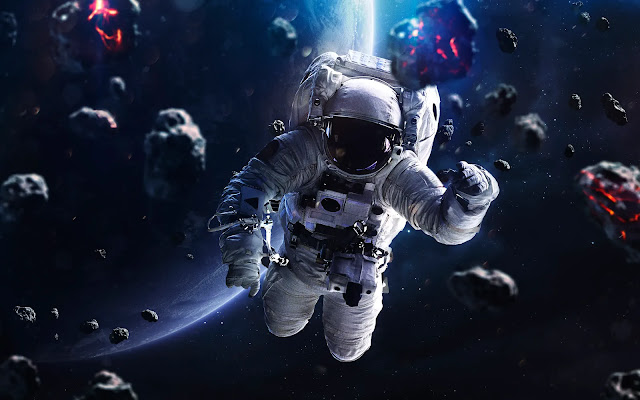25 Horrifying Space Facts you might havent heard about
Dark Energy Dominance: About 68% of the universe is composed of dark energy, a mysterious force driving the accelerated expansion of the cosmos. We know very little about it.
Gigantic Black Holes: Supermassive black holes, with masses millions or billions of times that of our Sun, lurk at the centers of most galaxies, including our Milky Way.
Cosmic Loneliness: Space is incomprehensibly vast, and our nearest star, Proxima Centauri, is over 4 light-years away. The vast distances make interstellar travel incredibly challenging.
Star Cannibalism: Some stars can cannibalize their neighboring stars. When a star gets too close to another, the gravitational forces can tear it apart, and the larger star absorbs its mass.
Gamma-Ray Bursts: These are intense bursts of gamma-ray radiation that can outshine an entire galaxy for a brief moment. The cause is still uncertain, but they could be linked to massive star explosions or neutron star collisions.
Space Debris Danger: Earth is surrounded by a growing cloud of space debris, including defunct satellites and fragments from collisions. This space junk poses a threat to both astronauts and operational satellites.
Cosmic Loneliness (Part II): The Fermi Paradox questions why, given the vast number of potentially habitable planets, we haven't detected any signs of extraterrestrial civilizations. Are we truly alone?
Mysterious Dark Matter: About 27% of the universe is made up of dark matter, an invisible substance that doesn't emit, absorb, or reflect light. Its nature remains one of the biggest mysteries in astrophysics.
Unstable Solar System: The solar system is not as stable as it may seem. The orbits of planets, especially the outer ones, can be influenced by the gravitational forces of other celestial bodies, leading to unpredictable long-term behavior.
Expanding Sun: In about 5 billion years, the Sun will exhaust its nuclear fuel and expand into a red giant, likely engulfing Mercury, Venus, and possibly Earth.
Galactic Cannibalism: Larger galaxies can devour smaller ones. The Milky Way is currently in the process of merging with the smaller Andromeda Galaxy, forming a new galaxy nicknamed "Milkomeda."
Solar System's Edge: Voyager 1, humanity's most distant spacecraft, entered interstellar space in 2012. It's now more than 14 billion miles away from Earth, sending back valuable data about the outer reaches of our solar system.
Space Sounds: The vacuum of space means there's no air to carry sound waves. So, despite the numerous explosions and cosmic events, space is completely silent.
Time Dilation: Intense gravitational fields, like those near black holes, can cause time to pass more slowly. A person near a strong gravitational field would age more slowly than someone in a weaker field.
The Great Attractor: The Milky Way, along with many other galaxies, is being pulled towards a mysterious region of space known as the Great Attractor. We're not sure what's causing this gravitational force.
Zombie Stars: White dwarfs, the remnants of dead stars, can reignite and explode as a type of supernova known as a "zombie star" under certain conditions.
Supervoid: The Boötes Void is an enormous, nearly empty region of space. It's about 330 million light-years in diameter, and its cause and implications are not fully understood.
Fermi Bubbles: Enormous bubbles of high-energy gamma-ray emissions extend above and below the Milky Way's galactic center. Their origin is still a matter of scientific investigation.
Neutron Stars: These ultra-dense remnants of massive stars can spin incredibly fast, sometimes hundreds of times per second. Their magnetic fields are also immensely strong.
Vacuum of Space: Space isn't completely empty. There are extremely low-density particles, such as cosmic dust and gas, scattered throughout the vast expanses between stars and galaxies.
Panspermia: The idea that life on Earth might have originated from microorganisms or organic molecules that traveled through space on comets or meteorites.
Heat Death: The eventual fate of the universe, according to current understanding, is the "heat death," where entropy maximizes, and all energy gradients are dissipated, leading to a state of uniform temperature and no more energy exchanges.
Black Hole Information Paradox: The fate of information that falls into a black hole is a source of ongoing debate in physics. The current understanding suggests that information might be lost, violating principles of quantum mechanics.
Tidal Forces: If you were to fall into a black hole, the difference in gravitational pull between your feet and head would be so extreme that you would be stretched into a long, thin strand of atoms in a process called "spaghettification."
The Fragility of Life: Space is a harsh environment, and without the protective atmosphere of Earth, humans are highly vulnerable. A small breach in a spacesuit or spacecraft can be life-threatening, emphasizing the extreme conditions of space travel.
25 Horrifying Space Facts you might havent heard about Video YOUTUBE

No comments:
Post a Comment